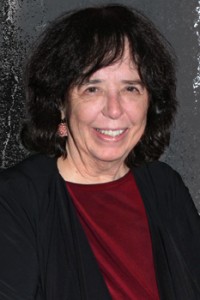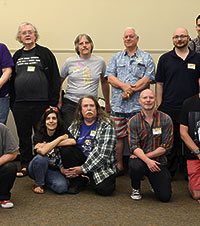Margo Lanagan: Dysfunctional Fables
 Margo Lanagan was born in Newcastle, New South Wales, Australia. She attended Catholic primary and high schools, went to the University of Western Australia in Perth for a year, and finished her BA in history at Sydney University in 1986. She has worked as a kitchen hand and encyclopedia seller, spent ten years as a freelance book editor, and works as a technical writer. She attended Clarion West in 1999, and returned as an instructor in 2011.Lanagan began her career writing nine pseudonymous teenage romances under such names as Melanie Carter, Mandy McBride, Gilly Lockwood, and Belinda Hayes. Under her own name she published fantasy YA novels WildGame (1991), The Tankermen (1992), and Walking through Albert (1998); mainstream teen novels The Best Thing (1995) and Touching Earth Lightly (1996); and The Quentaris Chronicles: Treasure Hunters of Quentaris (2004) and The Lost Shimmaron, Book 2: The Singing Stones (2007), both part of shared-world YA fantasy series.
Margo Lanagan was born in Newcastle, New South Wales, Australia. She attended Catholic primary and high schools, went to the University of Western Australia in Perth for a year, and finished her BA in history at Sydney University in 1986. She has worked as a kitchen hand and encyclopedia seller, spent ten years as a freelance book editor, and works as a technical writer. She attended Clarion West in 1999, and returned as an instructor in 2011.Lanagan began her career writing nine pseudonymous teenage romances under such names as Melanie Carter, Mandy McBride, Gilly Lockwood, and Belinda Hayes. Under her own name she published fantasy YA novels WildGame (1991), The Tankermen (1992), and Walking through Albert (1998); mainstream teen novels The Best Thing (1995) and Touching Earth Lightly (1996); and The Quentaris Chronicles: Treasure Hunters of Quentaris (2004) and The Lost Shimmaron, Book 2: The Singing Stones (2007), both part of shared-world YA fantasy series.
Lanagan is renowned for her short fiction. Notable works include Aurealis Award winner ‘‘The Queen’s Notice’’ (2000); ‘‘Singing My Sister Down’’ (2004), which won World Fantasy, Ditmar, and Aurealis Awards, and was a finalist for Sturgeon, Stoker, International Horror Guild, Hugo, and Nebula Awards; Tiptree finalist ‘‘Wooden Bride’’ (2004); Aurealis Award winner ‘‘A Fine Magic’’ (2006); and Ditmar Award winner ‘‘The Goosle’’ (2008). Her acclaimed original story collections include White Time (2000), World Fantasy Award winner Black Juice (2004), World Fantasy Award finalist Red Spikes (2006), and Yellowcake (2011).
Her YA novel Tender Morsels (2010), a brutal and controversial reimagining of ‘‘Snow White and Rose Red’’, won a World Fantasy Award and was a Printz honor book. The YA selkie novel Sea Hearts, an expansion of the World Fantasy Award-winning novella ‘‘Sea-Hearts’’ from 2010, is forthcoming.
 “I did some teenage romances as a kind of apprenticeship in the early ’90s, then some junior fantasies and the mainstream YA novels. I was writing an enormous brick of a fantasy novel, very badly, for about three years, when I saw the ad for Clarion West and thought, ‘Short stories: I can do that!’ That was when the whole world of speculative fiction opened up for me. Short stories and collections are a really big thing in speculative fiction – the scale of it just blew my mind. It was a whole wonderful world out there. The story ideas I’d been having were getting stranger and stranger anyway, so it was really a natural move from the literary over into fantasy.”
“I did some teenage romances as a kind of apprenticeship in the early ’90s, then some junior fantasies and the mainstream YA novels. I was writing an enormous brick of a fantasy novel, very badly, for about three years, when I saw the ad for Clarion West and thought, ‘Short stories: I can do that!’ That was when the whole world of speculative fiction opened up for me. Short stories and collections are a really big thing in speculative fiction – the scale of it just blew my mind. It was a whole wonderful world out there. The story ideas I’d been having were getting stranger and stranger anyway, so it was really a natural move from the literary over into fantasy.”
…
“Writing a book and reading a book provide the same places to explore things. If you have the ability and the opportunity to dissolve yourself in a story, as a reader or as a writer, then you’re generally in a fairly safe position from which to view the awful aspects of the world. I don’t tend to feel as if I have to grit my teeth and forge ahead into this difficult territory, so much as deal with very interesting problems. They tend to start out as quite technical story problems – of course, once I start prodding, them all this other stuff comes out of my darkest subconscious.”
…
 “I don’t think of Tender Morsels as horror. I don’t really know very much about horror, but I have the feeling that with a lot of horror fiction there’s a certain reveling in taking people to horrible places: Tender Morsels, I think, plays the violence very straight, doesn’t send it up or exaggerate. There’s a moment in the horror novel where you examine something awful for the sake of getting pleasure from the experience of examining it; I don’t think I’ve necessarily done that. I just sort of pause and get out of it a moment before a horror writer would. Adult readers have the imagination and the experience to supply all the awful details, whereas I was hoping at least that young-adult readers would realize something awful was going on but wouldn’t actually have to endure it themselves.”
“I don’t think of Tender Morsels as horror. I don’t really know very much about horror, but I have the feeling that with a lot of horror fiction there’s a certain reveling in taking people to horrible places: Tender Morsels, I think, plays the violence very straight, doesn’t send it up or exaggerate. There’s a moment in the horror novel where you examine something awful for the sake of getting pleasure from the experience of examining it; I don’t think I’ve necessarily done that. I just sort of pause and get out of it a moment before a horror writer would. Adult readers have the imagination and the experience to supply all the awful details, whereas I was hoping at least that young-adult readers would realize something awful was going on but wouldn’t actually have to endure it themselves.”
…
“One of my current projects is a Selkie novel which will come out first in Australia and the UK, next February. It’s really about female passivity (very nice fairytale stuff), with fishermen who all take selkie wives, and their children. Though I belong to a writers’ group and we do novels as well as stories, none of our meetings really synched up with my writing this, so it’s been a fairly solitary journey up until recently. There have been three separate editors (Australian, US, and the UK) and it’s been structurally edited twice.
‘‘This last year, I was so stupid: I took on about 12 different short story deadlines. It’s been like a row of targets I had to shoot down. I did them, and they were publishable, but then I had to redo my novel – and a novel is so much bigger a thing to fix than a short story! After all that, I get to go back to the ideas pile and write something that I feel like writing. I haven’t had that option for quite a while. I’m loving it.”







